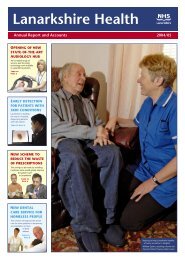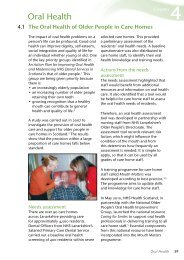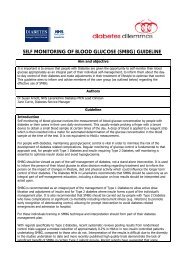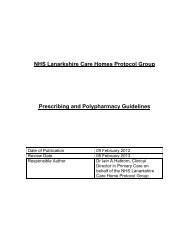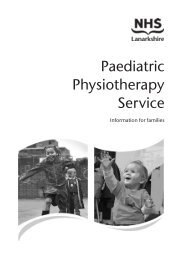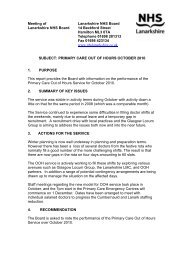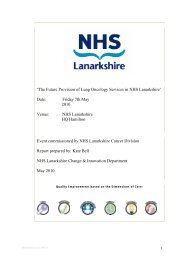Palliative Care Guidelines - NHS Lanarkshire
Palliative Care Guidelines - NHS Lanarkshire
Palliative Care Guidelines - NHS Lanarkshire
- No tags were found...
Create successful ePaper yourself
Turn your PDF publications into a flip-book with our unique Google optimized e-Paper software.
<strong>Palliative</strong> <strong>Care</strong> <strong>Guidelines</strong>: Patient information leafletQ. Are there any side effects from taking morphine?A. SleepinessThis is most common when you first take morphine or when the dose is increased. Itshould improve after a few days.ConstipationThis is a very common side effect. It is important to drink plenty of fluids and alwaystake a laxative regularly as prescribed by your doctor. The dose of laxative can beincreased or reduced to make sure you pass a soft motion regularly.SicknessIf you feel sick when you first start to take morphine, try taking it with food. Yourdoctor may need to give you some anti-sickness medicine for a few days until thesickness goes away.Q. Will I become addicted to morphine and unable to stop taking it?A. No. If you no longer need to take morphine, your doctor will reduce the dose gradually.Q. Will morphine always relieve my pain completely?A. Although morphine is a very good pain killer, it is not helpful for all types of pain.Other treatments may be needed and suggested by your doctor or nurse.Q. What do I do if I get pain between the regular doses of morphine?A. If the pain is mild, paracetamol may help. (Do not take more than 8 paracetamol tabletsin 24 hours). If it is more severe you should take a dose of quick acting morphine (seeabove). If you need more than 2-3 extra doses in a day, tell your doctor or nurse.Some people find that doing certain things like having a bath or going for a walkbrings on the pain. Your doctor or nurse may suggest you try taking a dose of quickacting morphine before your start doing something that brings on the pain.Q. How will I know if the morphine is not going to work for some of my pain?A. You may still have pain despite taking bigger doses of morphine and may feel unwellin one or more of these ways:• more sleepy than usual• feeling sick more of the time• restlessness or jumpiness• bad dreamsDo not worry if this happens. Tell your doctor or nurse. Your doctor may reduce yourdose of morphine and suggest other treatments to help the pain.Q. Can I drive?A. You may be able to drive but you must discuss this with your doctor.(Patient information leaflet: Strong pain killers and Driving).2 Issue date: January 2009 Review date: March 2012 © <strong>NHS</strong> Lothian



